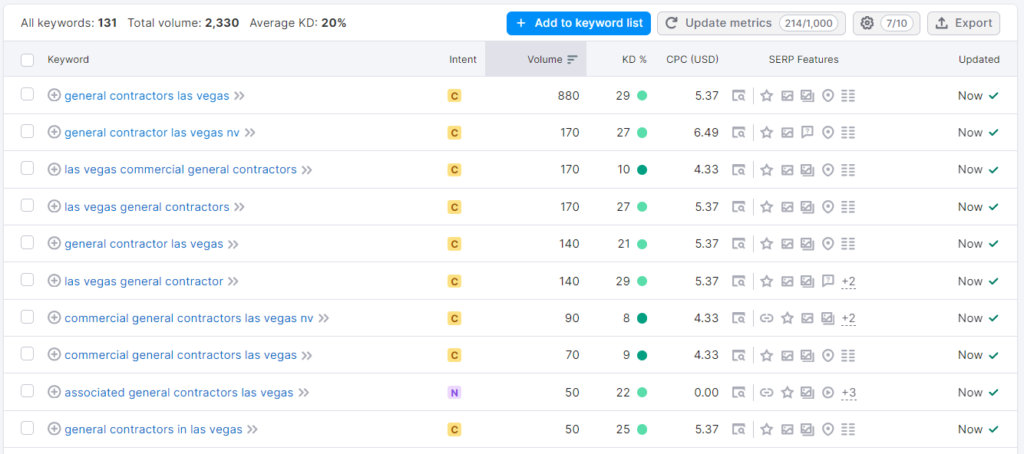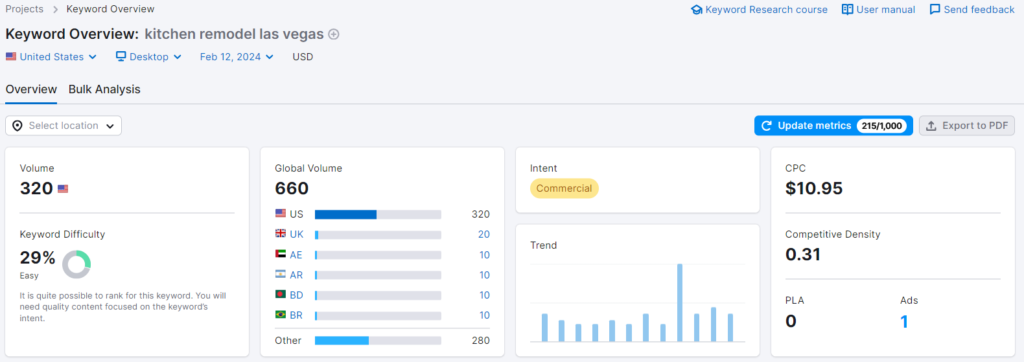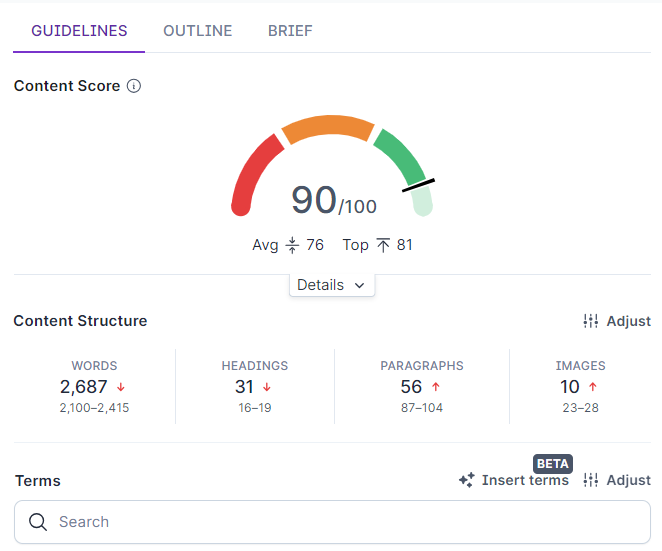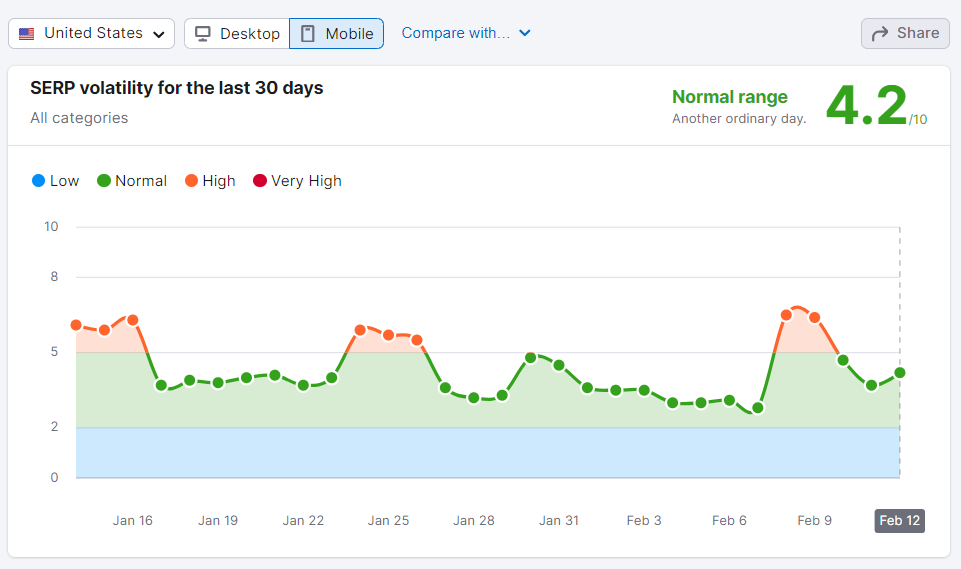SEO for General Contractors: Boost Your Online Visibility Today
James was just starting out when he contacted us for help with his residential general contractor startup. His good friend was (and still is) a client of ours and recommended James contact us for help. This is how we gain most of our clients today aside from our own SEO.
James needed a full website, SEO, conversion rate optimization, the whole works. We worked with his budget and James went from $0 revenue to winning bid after bid in his area. Today he has a crew, and has surpassed his revenue goals several times over. I’d love to tell you that it was fast and easy, but then I’d be lying. SEO is HARD work. It’s expensive and ongoing for the life of your company. Competitors are always trying to take your place, and James was starting from scratch. We had to work extra hard for this win.
| METRIC | BEFORE | AFTER |
|---|---|---|
| Revenue | Startup / $0 | $5.1 Million |
| Domain Authority | 0 | 41 |
| Monthly Visitors | 0 | 11,800 |
| Backlinks | 0 | 650 |
| Keyword Rankings | 0 | 1,200 |
| Number of Pages/Posts | 0 | 400 |
| Conversion Rate | N/A | 7% |
| Bounce Rate | N/A | 65% |
| Avg. Session Duration | 0 | 2:32 |
| Avg. Content Scores | 0 | 89/100 |
Welcome to the blueprint for enhancing your online presence with SEO for general contractors. In this case study and article, we provide actionable insights to help your business rank higher in search results, attract more website traffic, and secure more leads. Discover how local SEO, on-page optimization, and off-page strategies can transform your digital marketing efforts and cement your standing in the competitive construction companies industry. You’ll also get a taste for the ultra massive work load my team and I have to do do in order to get our clients to rank.
Table of Contents

Key Takeaways
- Local SEO is vital for general contractors, aiming to improve visibility in location-based searches and reduce advertising costs through strategies such as optimizing Google Business Profiles, using local keywords, and managing online reputation.
- Effective on-page SEO for contractors involves integrating relevant keywords into website content, optimizing meta titles and descriptions, and creating quality content that enhances user experience, which is crucial for higher search engine rankings.
- Off-page SEO, technical SEO, and regular measurement and optimization of SEO performance are essential parts of a comprehensive SEO strategy, which includes acquiring authoritative backlinks, ensuring mobile-friendliness, meeting Core Web Vitals standards, and adapting strategies based on analytics.
The Power of Local Search Engine Optimization for General Contractors

As an essential part of any contractor’s digital marketing plan, local SEO is a powerful tool targeting the tens of millions of consumers relying on online searches to discover local businesses. This SEO approach helps contractors increase their local visibility, especially in specific location-based searches, leading to increased customer engagement and an enhanced online reputation. Considering that over 90% of consumers use online local searches to locate local businesses, the importance of local SEO for contractors is evident.
Key local SEO practices for local business include:
- Using local keywords
- Maintaining accurate local citations
- Ensuring that the contractor’s services are transparent and easily discoverable to the local audience
- Optimizing a Google Business Profile to enhance visibility in Google search results
By employing a dedicated local SEO strategy, contractors can enhance their search engine rankings and secure a firm foothold in the local market. Implementing a custom contractor SEO strategy will further tailor the approach to suit their specific needs.

How Local SEO Benefits Your Contracting Business
Contractors can reap numerous benefits from contractor SEO services, including local SEO, which leads to:
- Elevated search engine rankings
- Amplified brand recognition
- Outperforming competitors in search engine rankings
- Steady growth over time
- Influencing brand recognition
- High-quality reviews significantly contributing to SEO
- Establishing a positive reputation for general contractors
The potential of local SEO to cut advertising costs stands as another significant advantage. By aligning with customers’ organic search intent, local SEO campaigns can significantly reduce the need for paid advertising, thereby lowering costs. Moreover, local SEO empowers contractors in managing their online reputation by enabling responsive interaction with customer reviews, which can lead to a 1,000% increase in review numbers.

Essential Components of a Local SEO Strategy
Several key components contribute to the success of a local SEO strategy. The foundation of local SEO is:
- Google My Business optimization, which allows businesses to manage their online presence across Google and improve visibility in local search results.
- Using local keywords in the Google Business Profile.
- Obtaining customer reviews on platforms like Google My Business, which can significantly influence visibility and search rankings.
Consistency is also crucial in local SEO. Maintaining consistent Name, Address, and Phone number (NAP) information is essential to prevent discrepancies that can negatively impact search engine rankings. Moreover, listing general contractor businesses in local directories can improve search engine rankings by providing additional data points for search engines to analyze and affirm the business’s local relevance.
Implementing On-Page SEO Techniques To Rank High In Search Engines

On-page SEO techniques focus on enhancing individual web pages to achieve higher ranks and draw more relevant traffic from search engines. An effective on-page SEO begins with thorough keyword research to understand user intent and find quality keywords to target. By thoughtfully incorporating relevant keywords into various elements such as search engine optimization of:
- Title tags
- Subheads
- URLs
- Anchor text
- Alt text
- Main content
General contractors in the construction business can optimize their pages for search engines by targeting keywords relevant to their construction company and other such construction businesses and companies.
Furthermore, the regular creation of informative and engaging content is pivotal for showcasing trustworthiness and solidifying the brand’s online presence. User experience also plays a significant role in SEO rankings, with search engine algorithms considering user behavior signals. Therefore, improving user experience, such as reducing website loading times and enhancing website navigability, can positively influence SEO rankings.
Optimizing Meta Titles and Descriptions
Meta titles and descriptions hold a significant place in on-page SEO. These HTML elements summarize the contents of a page for users and search engines, appearing under the headline in search engine results. While their direct impact on SEO rankings may have diminished in recent years, meta descriptions still influence SEO rankings to some extent.
Often referred to as ‘organic ad text,’ meta descriptions function to attract clicks from SERPs in a manner similar to advertising copy. By incorporating targeted keywords, relevance to content, and emotionally engaging language, well-crafted meta descriptions can raise the click-through rate of organic search results, increasing traffic without necessarily changing rankings.

Creating High-Quality Content with Local Keywords
The creation of high-quality content with local keywords lies at the heart of a successful SEO strategy. Local SEO keyword research is crucial for finding terms people use when looking for contracting services in their area. This can boost a general contractor’s organic visibility on relevant search results pages. Notably, businesses must differentiate between implicit local keywords, which suggest a search for nearby construction services, without specifying a location, and explicit local keywords that include specific location names or phrases like ‘near me’.
By listing the services offered and the locations served, contractors can generate seed keywords for further research to identify location-specific keywords tailored to each contractor services target area. These local keywords should be integrated thoughtfully into their website content to enhance local search rankings.
Moreover, creating individual local landing pages for each geographic area served helps contractors optimize their web presence for those locations and improve rankings in local google searches too.
Enhancing Off-Page SEO for General Contractors

Off-page SEO represents another vital facet of an efficient SEO strategy. It involves building trust and authority for a contractor’s website, mainly through acquiring backlinks from authoritative sites. Acquiring backlinks from prominent industry players such as home improvement blogs, local news, and trade organizations can significantly enhance a contractor’s off-page SEO.
Apart from backlinks, off-page SEO also involves:
- Guest posting on related industry sites, which can lead to valuable brand mentions and backlinks, thereby strengthening off-page SEO
- Hosting events like webinars
- Engaging in online forums
These activities can increase brand visibility and contribute to off-page SEO by potentially earning backlinks and social media mentions.
Building a Strong Backlink Profile
Establishing a robust backlink profile is paramount to enhance a contractor’s website authority and search engine rankings. Backlinks and referring domains play a significant role in determining the authoritative strength and authority of a website, particularly in local search and search engine results pages. Quality backlinks can be acquired through various methods, including:
- Listing in reputable online directories related to construction companies
- Forming link-building partnerships with local businesses
- Providing high-quality images to other websites for attribution
However, it’s essential to gain links organically rather than using black hat SEO techniques such as buying links or using spammy, irrelevant, or poor-quality websites. Maintaining a robust backlink profile also requires regular audits to address and fix any broken links, ensuring the backlink profile remains healthy and beneficial.
We typically leave backlink building for last because it’s an ongoing and time consuming process. Having amazing content and content marketing will make the entire backlink building stage easier.
Leveraging Social Media Platforms
In today’s digital era, social media platforms stand as influential tools for bolstering a contractor’s online presence and elevating search engine rankings. A robust social media presence can enhance a website’s SEO authority and contribute to better search engine rankings, thanks to activities like:
- promoting new content that can create additional backlinks and drive traffic
- engaging with followers and building a community
- sharing industry news and updates
- showcasing completed projects and client testimonials
By utilizing social media effectively, contractors can maximize their online visibility and attract more potential clients.
Interactive activities on social media channels such as polls and Q&A sessions, along with gaining insights from customer interactions, play a significant role in increasing audience engagement and can improve market intelligence and customer service. It is vital to select the appropriate social media platforms, such as YouTube for video content or LinkedIn for professional networking, to ensure content reaches the right audience and engages effectively.
Technical SEO Considerations for Contractors

Technical SEO represents a fundamental component of a triumphant SEO strategy. It focuses on optimizing technical aspects like website speed, Core Web Vitals, and mobile usability to bolster site performance. An effective website design ensures that website visitors can easily find what they are looking for, which is essential for SEO and lead generation.
Furthermore, monitoring the number of pages crawled per day is important, as it reflects the website’s crawl budget and indexing efficiency, which can impact SEO. Therefore, technical SEO is not just about making a website more attractive. It’s about making it more functional, user-friendly, and aligned with the requirements of search engine algorithms.
Ensuring Mobile-Friendliness
In the current mobile-centric era, possessing a mobile-friendly website has shifted from being optional to a necessity. Over half of all mobile searches have local intent, highlighting the need for general contractors to have mobile-friendly websites as many users search for local services while on the go.
Google’s mobile-first indexing means mobile-friendly sites are given priority in search rankings and indexing, emphasizing the importance of mobile optimization for contractor websites. Optimizing the mobile view of contractor websites is crucial as navigation and content display must be adapted for a smaller screen to provide a positive user experience.
A responsive website design that adjusts smoothly to different devices is essential for engaging users in the mobile world and aligning with Google’s mobile-first indexing requirements.
Improving Site Speed and Core Web Vitals
Both site speed and Core Web Vitals are fundamental to SEO. Faster page load speeds enhance user experience and are factored into Google’s search ranking criteria. Core Web Vitals consist of First Input Delay (FID) for responsiveness, Largest Contentful Paint (LCP) for loading performance, and Cumulative Layout Shift (CLS) for visual stability, with Google’s benchmarks set at FID under 100 milliseconds, LCP within 2.5 seconds, and CLS at 0.1 or less.
Improving website speed by just one second can lead to a seven percent increase in conversions, making it essential for contractors to retain visitors with a fast and responsive site. Therefore, contractors should strive to meet and exceed the performance metrics for Core Web Vitals while ensuring site speed is under two seconds to improve their SEO rankings and user experience.
Measuring and Optimizing Your SEO Performance

Evaluating and optimizing SEO performance is a critical component of a winning SEO strategy. Regular measurement helps identify shifts in search patterns, allowing for timely strategy adaptations. Tools such as Google Analytics can be used to monitor key engagement metrics like page visits, time spent on each page, and overall visitor behavior.
Other tools like Semrush’s Traffic Analytics or Ahrefs provide insights into organic traffic and domain performance. Tracking the conversion rate is crucial to determine if visitors are completing desired actions on a website. Therefore, monitoring SEO performance should initially be done weekly, with subsequent monthly reviews to analyze the longer-term performance trends.
Key Metrics to Monitor
To measure the success of an SEO strategy, several key metrics require monitoring. Organic traffic, for instance, refers to the number of visitors that come to a contractor’s website from unpaid search engine results, indicating the site’s visibility and attraction of relevant keywords.
Tracking local keyword rankings is also critical for monitoring the effectiveness of a local SEO strategy and noticing ranking changes to make timely adjustments. Additionally, the click-through rate (CTR) is a measure of the percentage of people who visit a website after viewing its pages in search results, reflecting the listings’ attractiveness.
Using tools like Google Analytics enables continuous measurement and analysis of SEO efforts, supporting data-driven decision-making.
Adapting Your SEO Strategy
Given the dynamic landscape of SEO, it’s paramount to adapt the strategy based on data analysis and insights from competitors. Regularly updating the SEO strategy is essential due to the dynamic nature of search engines, user behavior, and the competitive landscape.
Predictive analytics techniques, like forecasting SEO performance and identifying trends, can aid in proactively adjusting SEO strategies. Regularly monitoring and addressing the three Core Web Vitals (LCP, FID, and CLS) can greatly improve user experience and contribute to higher search engine rankings.
Analyzing competitor strategies through competitor keyword analysis and backlink analysis can reveal opportunities for SEO improvements.

Summary
In conclusion, the world of SEO presents a myriad of opportunities for general contractors to increase their visibility, outrank their competitors, and connect with their target audience more effectively. From understanding the power of local SEO and implementing on-page SEO techniques to enhancing off-page SEO and making technical SEO considerations, there are a number of strategies contractors can employ to boost their online presence.
These strategies, combined with regular measurement and optimization of SEO performance, can help contractors stay ahead in the ever-evolving digital landscape. So, whether you’re just starting out in the world of digital marketing or looking to fine-tune your existing content marketing strategy, remember: SEO is not a one-time task, but an ongoing process that requires regular evaluation and adaptation. The digital world is your oyster, and SEO is your pearl!
Frequently Asked Questions
What is SEO for contractors?
SEO for contractors involves using digital marketing strategies to improve a website’s rankings by incorporating relevant keywords related to the contracting company and construction industry. This is done to make it easier for potential customers to find the website when searching for related terms.
Is SEO worth it for local businesses?
Yes, investing in SEO is definitely worth it for local businesses. The potential ROI for a carefully crafted SEO strategy can range from 5x to 15x for every dollar spent, making it a valuable long-term investment.
How does off-page SEO enhance a contractor’s online presence?
Off-page SEO enhances a contractor’s online presence by building trust and authority through acquiring backlinks from authoritative sites and leveraging social media platforms.
What role does mobile-friendliness play in SEO?
Mobile-friendliness plays a crucial role in SEO because many users search on mobile devices and it aligns with Google’s mobile-first indexing requirements. This makes it essential for a website to be mobile-friendly.
What are the key metrics to monitor in an SEO strategy?
The key metrics to monitor in an SEO strategy are organic traffic, local keyword rankings, and click-through rates. These metrics help track the effectiveness of your SEO efforts and identify areas for improvement.
If you want help with your website traffic please reach out to my amazing team and we’ll figure out a great plan for you!
